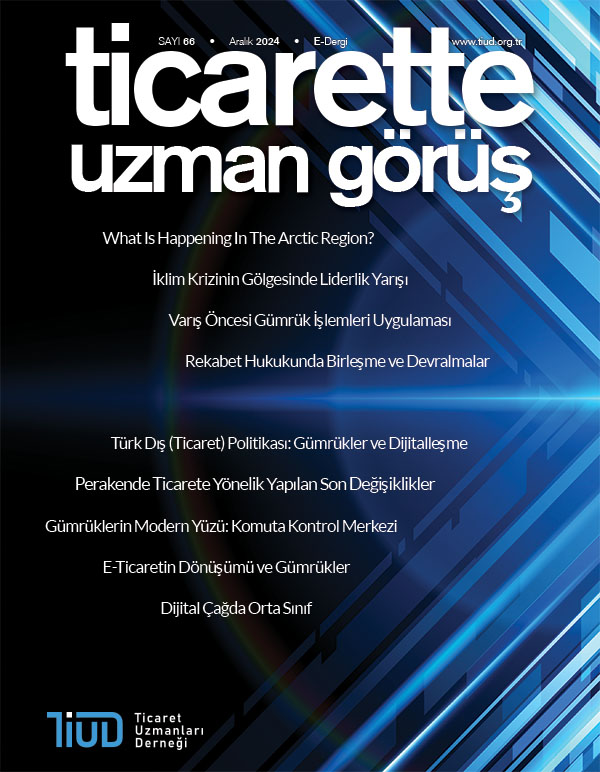-
Yeni Batı Mah. Palandöken Cad. No: 92 Yenimahalle/ANKARA
How Can Global Governance Foster Collaboration to Repair And Strengthen Supply Chains in the Post-COVID-19 Era?

ÖZET
Bu makale, COVID-19 pandemisinin ve Rusya’nın Ukrayna’ya yönelik saldırganlığının küresel tedarik zincirleri üzerindeki etkilerini incelemektedir. Pandemi, küresel tedarik zincirlerinde önemli aksamalara neden olmuş, temel mal ve hizmetlerin arzında büyük sıkıntılar yaratmıştır. Pandeminin ardından gelen Rusya’nın Ukrayna’ya saldırısı ise bu krizleri daha da derinleştirerek gıda, enerji ve diğer kritik sektörlerde ek zorluklar doğurmuştur.
Makale, küresel yönetişimin bu sorunlara nasıl daha etkili çözümler sunabileceğini tartışmakta, Dünya Ticaret Örgütü (WTO) ve Dünya Gümrük Örgütü (WCO) gibi uluslararası kurumların oynadığı rollerin altını çizmektedir. Ayrıca, tedarik zincirlerindeki darboğazların ve gerilimlerin giderilmesi için öneriler sunulmakta ve gelecekte benzer krizlerin önlenmesi için daha dirençli ve çeşitli tedarik zincirleri oluşturmanın önemine vurgu yapılmaktadır.
Anahtar Kelimeler: COVID-19, COVID-19 Sonrası Dönem, Tedarik Zinciri, Küresel Yönetişim.
ABSTRACT
This article examines the impacts of the COVID-19 pandemic and Russian aggression in Ukraine on global supply chains. The pandemic caused significant disruptions in global supply chains, leading to major shortages of essential goods and services. Following the pandemic, Russia’s aggression against Ukraine further deepened these crises, creating additional challenges in food, energy, and other critical sectors.
The article discusses how global governance can offer more effective solutions to these issues, highlighting the roles played by international institutions such as the World Trade Organization (WTO) and the World Customs Organization (WCO). It also provides recommendations for addressing bottlenecks and tensions in supply chains and emphasizes the importance of building more resilient and diversified supply chains to prevent similar crises in the future.
Keywords: COVID-19, Post-COVID-19 Era, Supply Chain, Global Governance.
1. INTRODUCTION
The global impact of the COVID-19 pandemic has left a lasting imprint, with its effects still reverberating today. In a survey conducted by Ernst & Young involving 200 senior-level supply chain executives, only 2% of participants reported full recovery from the effects of the COVID-19 pandemic. (EY, 2023) Additionally, the survey revealed that COVID-19 exacerbated challenges in supply chains, emphasizing priorities such as visibility, resilience, and digitization. Today, the quest to create a more equitable global landscape with respect to supply chains for different products is expected to encounter two major challenges of scale: the impacts of COVID-19 and the impact of the Russia–Ukraine war. (Sandford) In the wake of the unprecedented disruptions unleashed by the global COVID-19 pandemic, the intricacies of international trade and supply chain dynamics have become focal points for recovery and resilience. The pandemic, with its far-reaching impact, exposed vulnerabilities in supply chains, causing shortages of essential goods and highlighting the world’s unpreparedness for such supply shocks. Despite a return to normalcy in many countries, particularly with the rollout of vaccinations, supply chains have yet to fully bounce back. (DHL) Compounding these challenges, the Russian aggression war against Ukraine further struck at the heart of global supply chains, particularly in the food and energy sectors.
This essay embarks on a comprehensive exploration of the multifaceted challenges posed in the post-COVID-19 era, guided by a central inquiry: “How can global governance foster collaboration to revitalize and strengthen resilient supply chains in the aftermath of COVID-19 and conflict?” The pandemic is anticipated to have lasting effects on global supply chains. Due to virus mutations, significant exporting nations have implemented stringent lockdown measures (Goshwami), moreover, the long- and short-term impacts of the war have heightened the vulnerability of supply chains. (Bond, Cornago, Mortera-Martinez, & Scazzieri, 2022) The war has crossed borders, underscoring the need for a detailed examination of the roles and responsibilities of global governance structures in addressing and alleviating these intricate challenges.
Contemplating the disruptions in supply chains makes it clear that relying solely on national governments or local, regional, and private solutions may prove inadequate in today’s highly interconnected world. Former EU Commissioner Peter Mandelson succinctly captures this sentiment, emphasizing that “a global economy necessitates global economic governance.” (Mandelson, 2008) This suggestion applies to various global issues, including supply chains, food shortages, and climate change. The inefficiency problems of national governments in addressing these global challenges create a perception of “nobody in charge,” despite living in an interconnected world. (Lopez-Claros, A., & Groff, The Challenges of the 21st Century, 2020) In the battle against the world’s wicked problems, individuals seek a robust and organized global entity. It is imperative to have effective and credible mechanisms for international cooperation that are seen as legitimate and capable of representing the interests of humanity as a whole, rather than catering to the interests of specific countries. (Lopez-Claros, A., & Groff) As we grapple with the complexities of this new era, the essay delves into the pragmatic imperatives of fostering collaboration among nations, international organizations, and various stakeholders. Against this backdrop, the roles played by prominent entities such as the World Trade Organization (WTO) and the World Customs Organization (WCO) come under scrutiny, providing insights into their contributions and potential strategies for recalibrating global trade dynamics. This essay seeks to unravel the layers of complexity inherent in post-pandemic trade scenarios, shedding light on the essential facets that demand concerted efforts and cooperative frameworks for sustained recovery and growth on the global stage.
2. EFFECTS OF THE COVID-19 PANDEMIC AND RUSSIAN AGGRESSION IN UKRAINE ON SUPPLY CHAINS
Addressing global wicked problems necessitates a level of governance that transcends national boundaries and regional limitations. Essential for addressing global challenges is the establishment of credible international mechanisms that act in the best interests of humanity as a whole, rather than favoring specific countries. (Lopez-Claros, A., & Groff, 2020) When the outbreak of COVID-19 showed us that the global community was unprepared, and as stated by Allam, in particular, the supply chain networks showcased their inability to respond effectively to the unprecedented demand-supply pressures. (Allam, Bibri, & Sharpe) As global governance endeavors to grapple with the repercussions of the COVID-19 pandemic, the abrupt initiation of the Russian aggression war against Ukraine has introduced a new dimension of complexity. This geopolitical development has further exacerbated the existing crises, prominently influenced the dynamics of supply chains, and contributed to energy crises. The concurrent occurrence of these challenges is graphically represented in Figure 1 below, illustrating the compounding impact arising from both the COVID-19 pandemic and the ongoing conflict between Ukraine and Russia. (Allam, Bibri, & Sharpe, 2022)
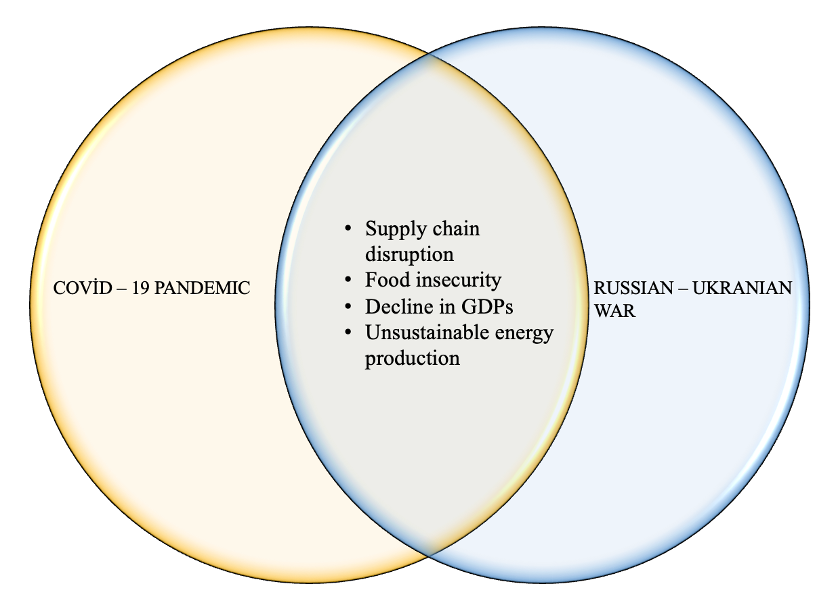
As illustrated in Figure 1, both the COVID-19 pandemic and the Russian-Ukrainian conflict have engendered similar challenges for global governance, particularly in terms of supply chain disruptions. The convergence of these multifaceted crises necessitates a comprehensive approach, recognizing the interconnected nature of the issues. Thus, in seeking resolutions for the challenges emanating from these two distinct yet interrelated sources, a holistic perspective that addresses both concurrently becomes imperative.
Both the COVID-19 pandemic and the Russian-Ukrainian conflict present similar challenges to global governance, especially regarding supply chain disruptions.[1] Addressing these interconnected crises requires a comprehensive approach. The Russian aggression against Ukraine has severely impacted global food, oil, and energy supply chains, particularly devastating the grain sector due to Ukraine’s key role. The strategic blockade of Ukraine’s major ports, Port Odessa and Port Mariupol, by Russia, has triggered a significant post-covid supply chain crisis. This geopolitical move reverberates globally, affecting industries and trade networks beyond Ukraine’s borders. (Figure 2)
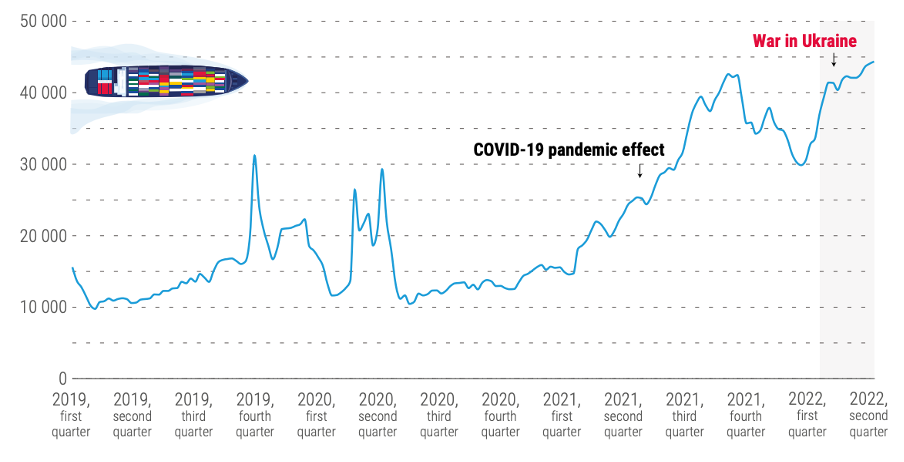
This crisis has echoed on a global scale, amplifying its impact on Africa, where heightened levels of hunger have been exacerbated by disruptions in the supply of essential grains. Furthermore, Ukraine’s significant position as one of the largest sunflower oil producers has led to a surge in oil prices. (Figure-3) This escalation in oil prices, in turn, has contributed to a widespread increase in food inflation across the world. The multifaceted repercussions of the conflict highlight the interconnectedness of global supply chains and emphasize the far-reaching consequences of geopolitical disturbances on essential commodities.
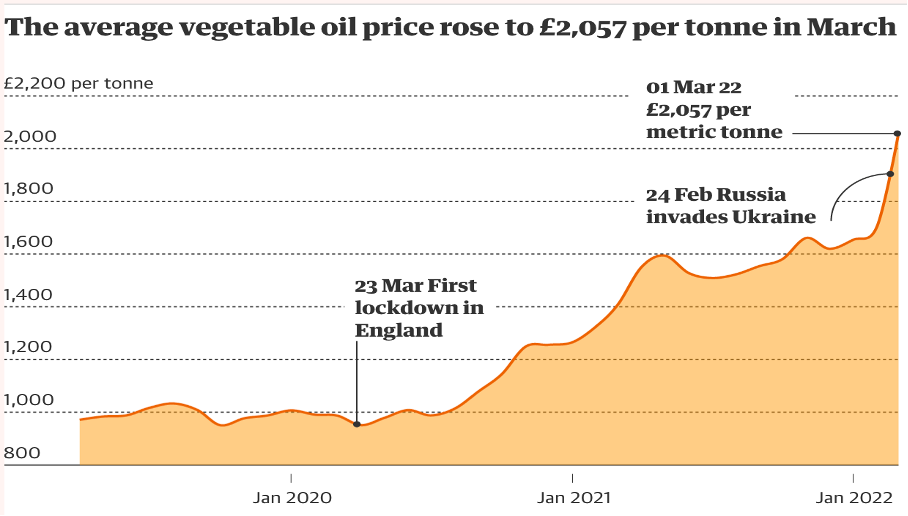
The Russian aggression against Ukraine has not only sparked a food crisis but also triggered a severe energy crisis, profoundly impacting global stability. Russia, a key European energy supplier, played a vital role in meeting the continent’s energy demands. The war disrupted this supply, causing a significant crisis that reverberated globally.
The abrupt halt of Russian energy exports to Europe led to a sudden surge in energy prices, creating challenges for European nations and contributing to a broader global inflationary impact. The interconnected global economy magnified the repercussions, raising concerns about economic stability, increased costs, and broader implications for various industries.
This crisis underscores the intricate relationships within the international energy market, emphasizing the need for diversified and resilient energy strategies to mitigate geopolitical disruptions. The aftermath highlights the urgency of addressing these challenges regionally and globally.
In the face of a growing food crisis, Russia and Ukraine came together in Antalya with Turkey mediating the discussions.[4] These talks, known as the Antalya rounds, led to a crucial agreement: the establishment of a grain corridor.[5] This corridor, overseen by Russia, is a joint effort to address disruptions in the global grain supply chain caused by their conflict.
The creation of the grain corridor underscores the significant role of international collaboration in resolving complex challenges. It also emphasizes the need for a robust global governance system capable of effectively addressing and preventing such serious problems. The reliance on diplomatic negotiations and cooperative mechanisms highlights the demand for a coordinated and comprehensive approach to managing crises that extend beyond national borders.
3. THE ROLE PLAYED BY WTO AND WCO IN THE COVID-19 PANDEMIC AND POST-CRISIS SCENARIO
The identified issues are self-evident, prompting an inquiry into the global governance organizations actively engaged in addressing and remedying these challenges. In the context of supply chain disruptions, paramount attention is directed towards the World Trade Organization (WTO), which is a pivotal entity playing an integral role in mitigating the aforementioned problems.
The World Trade Organization (WTO) characterizes itself as “the only global international organization dealing with the rules of trade between nations. At its heart are the WTO agreements, negotiated and signed by the bulk of the world’s trading nations and ratified in their parliaments. The goal is to ensure that trade flows as smoothly, predictably, and freely as possible.”[6] Aligned with its self-identification, the World Trade Organization (WTO) has proactively responded to COVID-19 challenges. Issuing reports targeting issues within global supply chains, the WTO demonstrates a commitment to finding solutions amid the crisis. This underscores the organization’s role in fostering resilience and cooperation in international trade during challenging times.
WTO Director-General Ngozi Okonjo-Iweala emphasized the significant role the WTO can assume in fortifying global supply chains and facilitating economic recovery from the impact of the COVID-19 pandemic and other prevailing global challenges. This perspective was articulated during a Global Supply Chains Forum.[7] Upon reviewing the World Trade Organization’s (WTO) response to the post-COVID era and the Russian Aggression against Ukraine, it’s clear the organization made significant efforts to address ensuing challenges. The global recognition of the importance of cooperation in our interconnected world further highlights the significance of unified efforts in navigating complex geopolitical situations.
In addition to the WTO, the World Customs Organization (WCO) stands out as another key institution directly involved in addressing supply chain issues. Customs, historically integral for revenue collection and security, have evolved into crucial players in trade facilitation and digital supply chain advancements. This transformation highlights a modern understanding of customs’ pivotal role in fostering efficient trade practices. The WCO, with 183 member customs administrations representing 98 percent of global trade, stands as the exclusive intergovernmental entity addressing customs affairs. (Shri. T. Samaya Murali) The WCO plays a vital role in global trade facilitation. Amidst the challenges of the COVID-19 pandemic, it has proactively initiated various efforts to secure the global supply chain, collaborating with international organizations to alleviate the pandemic’s impact on socioeconomic conditions.
The World Customs Organization (WCO) has played and continues to play a pivotal role in addressing the challenges posed by the COVID-19 pandemic. This involves making joint declarations, disseminating crucial information on customs procedures, and emphasizing the significance of trade facilitation during a global economic, human, and public health emergency. The WCO, in collaboration with esteemed international organizations like the United Nations (UN), the World Health Organization (WHO), and the World Trade Organization (WTO), as well as its stakeholders, has been instrumental in providing guidance for navigating these unprecedented circumstances. (Weerth, 2020)
Since February 19, 2020, the WCO has actively tackled global supply chain disruptions caused by the ongoing challenges, particularly the Covid-19 pandemic. Through various communications and collaborations with partner organizations, the organization strives to navigate complexities, maintain customs vigilance, and facilitate smooth trade flow amid unprecedented challenges. (WCO)[8] Moreover, in June 2020, the World Customs Organization (WCO) launched the “Project to Enhance the Capacities of Customs Administrations in Developing Countries to Address the Impact of COVID-19.”[9] This initiative is strategically designed to ensure the security, stability, and seamless continuity of global supply chains. Concurrently, it seeks to facilitate the swift movement of emergency relief goods worldwide by bolstering the disaster preparedness capabilities of customs administrations. Finally, it’s worth noting that on April 6, 2020, the WCO and the WTO collaborated to release a joint statement, emphasizing their commitment to “joining forces to minimize disruptions to cross-border trade in goods.”[10]
Considering the challenges of the COVID-19 pandemic and the roles of international organizations like WHO, WTO, and WCO in managing its impact on global supply chains, it is clear that effective global governance is vital for maintaining uninterrupted supply chains during and after crises. Despite states being caught off guard, these organizations took proactive steps, offering essential guidance and facilitating a smoother path forward amid persistent challenges.
4. CRITIQUES OF GLOBAL GOVERNANCE IN THE POST-COVID ERA
Effectively managing global challenges like COVID-19 requires recognizing the dependence of organizations such as the WTO and WCO on individual countries. Robust supply chains necessitate well-executed global plans and a coordinated response, emphasizing collaboration among nations. The WTO and WCO’s effectiveness in addressing COVID-19 challenges depends on individual states, each contributing unique capabilities. Proactive measures by international organizations require precision and efficiency, with success hinging on the collaboration and commitment of individual states.
Ongoing discourse on global governance complexity and challenges faced by the global community highlights the need for continued assessment and refinement. Simultaneously, international organizations’ efforts to navigate challenges reveal complex issues, with the rise of populism challenging collaborative frameworks. This underscores the need for a thoughtful and adaptive approach to address the evolving landscape of global governance.
The ascent of populism underscores a prevailing sentiment within the global community that views global governance as a potential threat to national states and identities. This perception is rooted in the belief that states, as ancient institutions with a history dating back around 10,000 years to the emergence of the first agricultural societies in Mesopotamia, possess inherent rights and legitimacy in wielding enforcement powers. (FUKUYAMA, 2004) Unlike states, which have organically evolved over millennia, international organizations are perceived as less natural or legitimate by people worldwide. These entities result from prolonged negotiations between sovereign states, creating a significant divergence in global perceptions. International organizations are often viewed as more artificial and less ingrained in human history compared to the ancient and habitual nature of states.
Fukuyama aptly points out a critical issue at the international level—the challenge of enforcement. He contends that the concept of the “international community” is, to a significant extent, a fiction, as the ability to enforce decisions relies entirely on the actions of individual nation-states. (FUKUYAMA, 2004) This observation delves into the broader dynamics of global governance, highlighting the inherent limitations and complexities faced when attempting to foster collective action on an international scale.
Fukuyama emphasizes the pivotal role of sovereign states in international enforcement mechanisms. Relying on individual nation-states for enforcement raises questions about global governance effectiveness, highlighting the intricate interplay between state sovereignty and common objectives in international relations. (Fukuyama, 2004)
As we evaluate the capacities of individual states and the global perception of international organizations, it’s crucial to recognize that the WTO is not exempt from criticism. Specifically, concerns have been raised about the potential negative impact of its stringent rules on supply chains. While the WTO’s international trade rules were intended to diversify supply chains, they have led to a concentration of supply chains in certain countries, notably China. (Meyer,2020) The recent crisis has underscored the critical importance of fostering resilient supply chains through diversification. The World Trade Organization (WTO) has a Free Trade Agreement mechanism aimed at promoting diversification and discouraging protectionism. However, this mechanism has not been impervious to criticism, as it is perceived to be ineffective in practice. (Meyer, 2020)
The core criticism of the current crisis stems from the sluggish responses of global governance. Notably, since the Doha Round, the World Trade Organization (WTO) has undergone minimal changes. (Baldwin, R., Kawai, M., Wignaraja, G.) In the post-COVID era, the world has rapidly transformed. Acknowledging the necessity to adapt to these evolving circumstances, there is a call for a revamped version of the WTO, often referred to as WTO 2.0, to ensure its relevance and effectiveness in the contemporary global landscape.
In today’s Global Governance, there’s a dual challenge: an absence of an efficient enforcement mechanism and a notable dearth of effective leadership. The rise of populism has led to strong national leaders, but at the global level, institutions are often perceived as bureaucratic, creating a leadership vacuum. Many countries, including longstanding democracies, have faced leadership strain, with a tendency toward ‘strongman’ leaders, particularly during the pandemic. (Anheier, H. & Knudsen, E.)
In the face of global populism and rising polarization, constructing a robust global governance framework is challenging. Fostering collaboration among nations is demanding, emphasizing the critical need for a unified approach to ensure resilience in navigating global changes and challenges.
5. ADDRESSING THE BOTTLENECKS AND TENSIONS ENDANGERING GLOBAL SUPPLY CHAINS.
5.1. Blockade of Suez Canal
Setting aside all criticisms, it is undeniable that a robust and effective global governance system is imperative for the seamless operation of supply chains. This necessity arises from the fact that many challenges transcend the boundaries of individual states. A striking example is the Suez Canal blockade, which occurred on March 23, 2021, when the Ever Given, an immense container ship, obstructed one of the world’s busiest shipping routes. This incident disrupted the transit of over 400 vessels in both the East-West and West-East directions. (Lee & Wong, 2021) The financial toll of this disruption is staggering, with estimates suggesting that the losses and damages resulting from the blockage could surpass $1 billion (£730 million), according to the authority managing the waterway.[11]
5.2. Possible Blockade of Malacca Strait
Global supply chains face a potential bottleneck with the threat of a blockade in the Malacca Straits. Coined as the “Malacca Dilemma” by then-Chinese President Hu Jintao in November 2003, this term highlights China’s vulnerability to a naval blockade at this strategic chokepoint. The Malacca Straits serve as the shortest sea route linking the Middle East and East Asia.[12] Chris Ogden defines this dilemma in his dictionary “A fear that the Straits of Malacca in South East Asia will be blocked, critically interrupting China’s supply of oil and gas from West Asia. Such an event would also threaten the country’s continued economic growth, as well as disrupt its world-leading global economic exports and imports. It is a major concern within China’s energy security policy, especially given the additional threat of piracy in the Straits of Malacca”(Ogden, 2019)
China is not the sole nation relying on the Malacca Strait; countries like Japan, South Korea, and Taiwan also depend on this narrow sea passage. Stretching one and a half miles wide, the strait serves as a strategic gateway between the Pacific and Indian Oceans, located between the Malay Peninsula in the north and the Indonesian island of Sumatra in the south. This shipping chokepoint facilitates $3.5 trillion worth of global trade annually, including two-thirds of China’s maritime trade, 40 percent of Japan’s maritime trade, and nearly one-third of the total worldwide trade volume.[13]
Regarding the Malacca Dilemma, China sees it as both an economic and national security concern. In February 2023, China unveiled The Global Security Initiative Concept Paper (GSI)[14], emphasizing enduring regional security tensions due to sporadic local conflicts and the ongoing COVID-19 pandemic. The rise of unilateralism and protectionist measures adds complexity, intertwining traditional and non-traditional security threats. The GSI outlines six fundamental concepts and principles within this report: Stay committed to:
- the vision of common, comprehensive, cooperative, and sustainable security.
- respecting the sovereignty and territorial integrity of all countries.
- abiding by the purposes and principles of the UN Charter.
- taking the legitimate security concerns of all countries seriously.
- peacefully resolving differences and disputes between countries through dialogue and consultation
- maintaining security in both traditional and non-traditional domains.
5.3. Are China and the USA Currently Experiencing The Thucydides’ Trap?
Against the backdrop of the escalating trade war between China and the USA, coupled with increasing tensions in the Pacific region, China’s Global Security Initiative (GSI) emerges as a pivotal stride. The trajectory of China’s ascendant power and the corresponding reactions from the USA present a less-than-optimistic outlook for the future. Notably, Harvard professor Dr. Graham Allison, in 2015, delved into the potential for conflict between the U.S. and China, coining the term “Thucydides’ Trap” to encapsulate the precarious dynamic between rising and established powers.[15] In his book, Allison succinctly defines Thucydides’ Trap as “…when a rising power threatens to displace a ruling power, alarm bells should sound: danger ahead.” He emphatically adds, “China and the United States are currently on a collision course for war unless both parties undertake difficult and painful actions to avert it.”(Allison & Andrew Hastie, 2017)
In a demonstration of this pattern, Allison and his team at the Harvard Belfer Center for Science and International Affairs conducted a comprehensive analysis of 16 historical instances where the Thucydides Trap was identified. Strikingly, 12 of these cases culminated in war, underscoring the potential dangers. In the remaining four instances where armed conflict was averted, both parties involved had to navigate significant and arduous adjustments to establish a delicate equilibrium.13
Anticipating the outcome of the Thucydides Trap situation between China and the USA is challenging. Coupled with our contemplation of the supply chain bottlenecks, it becomes increasingly evident that a robust global governance framework is indispensable. This framework is crucial for fostering cooperation between states and pre-empting additional disruptions to supply chains arising from bottlenecks or trade wars.
6. CONCLUSION
The global impact of the COVID-19 pandemic has highlighted the need for collaborative efforts to repair and fortify resilient supply chains in the post-COVID-19 eras. The sudden onset of the pandemic disrupted established norms, fracturing supply chains and triggering crises on a monumental scale. International organizations such as the World Health Organization (WHO), the World Trade Organization (WTO), and the World Customs Organization (WCO) played a pivotal role in guiding collective responses to combat the pandemic. Coordinated measures and shared expertise underscored the crucial importance of international cooperation in addressing global challenges.
In the post-pandemic era, the eruption of Russian aggression presents a new challenge, straining already disrupted supply chains and reducing their resilience. Russia’s exclusion from global supply chains due to sanctions heightens security challenges, emphasizing the urgent necessity for international collaboration in the post-COVID era. The vulnerability of supply chains remains a crucial concern as geopolitical events shape the global economic landscape.
Expanding our perspective to the bottlenecks affecting supply chains, as discussed in this essay—maritime passages, Pacific region tensions, and the looming prospect of future conflicts—remains deeply concerning. Beyond these geopolitical challenges, additional threats such as climate change, immigration, and the concentration of manufacturing in specific countries pose significant risks to the stability of supply chains. Addressing these multifaceted challenges necessitates a concerted global coordinating effort. As we navigate the complexities of the post-COVID-19 era, a comprehensive approach is essential to fortify and enhance the resilience of supply chains on a global scale.
Having adeptly outlined the intricate challenges at hand, it is opportune to reiterate our initial question: “How can global governance foster collaboration to repair and strengthen resilient supply chains in the post-COVID-19 era?” Tackling wicked problems of this nature resists straightforward solutions, yet constructive suggestions can pave the way through these complexities.
One approach involves fortifying global institutions and reconsidering enforcement mechanisms, notably within organizations like the World Trade Organization (WTO). Drawing lessons from the experiences of the COVID-19 pandemic and Russian aggression against Ukraine, there is a call to fortify or establish global institutions better equipped to handle future crises.
Diversifying manufacturing and distributing the risk of supply chain disruptions emerges as a strategic response. Simultaneously, addressing bottleneck issues stemming from maritime passages, climate change, and immigration requires innovative solutions. Initiatives such as the implementation of Authorized Economic Operator Status by the World Customs Organization (WCO) throughout Europe and third countries showcase the potential of public-private sector cooperation.
Recognizing the evolving global landscape, global governance organizations, particularly the WTO and WCO, may need to adapt their structures and legislation to remain relevant. Embracing digitalization is paramount in fostering resilient supply chains. Equally crucial is the development of sustainable solutions for climate change and immigration crises, even as we navigate the challenging terrain of conflict resolution, where the ability of global governance must be continuously refined.
7. BIBLIOGRAPHY
Allison, G., & Andrew Hastie, A. (2017). Destined for War : Can America and China Escape Thucydides’ Trap? Scribe Publications. http://ebookcentral.proquest.com/lib/exeter/detail.action?docID=4876845
Anheier, H., & Knudsen, E. (n.d.). The 21st Century Trust and Leadership Problem: Quoi Faire?
Baldwin, R., Kawai, M., & Wignaraja, G. (n.d.). A World Trade Organization for the 21st century : the Asian perspective.
Lee, J. M., & Wong, E. Y. (2021). Suez Canal blockage: an analysis of legal impact, risks and liabilities to the global supply chain. MATEC Web of Conferences, 339, 01019. https://doi.org/10.1051/matecconf/202133901019
Meyer, T. (2020). Trade Law and Supply Chain Regulation in a Post-Covid-19 World. American Journal of International Law, 114(4), 637–646. https://doi.org/10.1017/ajil.2020.64
Ogden, C. (2019). ‘Malacca Dilemma’. Oxford University Press. https://doi.org/10.1093/acref/9780191848124.013.0106
Allam, Z., Bibri, S., & Sharpe, S. (2022, July 24). The Rising Impacts of the COVID-19 Pandemic and the Russia–Ukraine War: Energy Transition, Climate Justice, Global Inequality, and Supply Chain Disruption. Resources, p. 5.
Allam, Z., Bibri, S., & Sharpe, S. (2022). The Rising Impacts of the COVID-19 Pandemic and the Russia–Ukraine War: Energy Transition, Climate Justice, Global Inequality, and Supply Chain Disruption. Resources,, 6, 99. https://doi.org/10.3390/resources1111
Bond, I., Cornago, E., Mortera-Martinez, C., & Scazzieri, L. (2022). Russia’s War on Ukraine: There is Worse to Come (for the West as Well). Center For European Reform’s Insight, Available online: https://www.cer.eu/insights/russias-war-ukraine-worse-west (accessed on 02 December 2023).
DHL. (n.d.). DHL. Understanding the “New Normal” Supply Chain Risks in 2022 and Beyond. Available online: https://www.dhl.com/global-en/delivered/globalization/supply-chain-risks-in-2022.html (accessed on 01 December 2023).
EY. (2023). How COVID-19 impacted supply chains and what comes next? Available online: https://www.ey.com/en_gl/supply-chain/how-covid-19-impacted-supply-chains-and-what-comes-next (Accessed on 2 December 2023).
FUKUYAMA, F. (2004). Cornell University Press. http://www.jstor.org/stable/10.7591/j.ctvrf8c1g. In F. FUKUYAMA, State-Buildin g: Governance and World Order in the 21st Century. (Vol. http://www.jstor.org/stable/10.7591/j.ctvrf8c1g). Cornell University Press.
Goshwami, S. (n.d.). 4th Wave of COVID-19 in USA, India, China, and Other Countries. available online: https://dmerharyana.org/4th-wave-of-covid-19/ (accessed on 01 December 2023).
Goshwami, S. (n.d.). 4th Wave of COVID-19 in USA, India, China, and Other Countries. Available online: https://dmerharyana.org/4th-wave-of-covid-19/ (accessed on 3 December 2023).
Lopez-Claros, A., A., L. D., & Groff, M. (2020). Challenges of the 21st Century. Cambridge University Press.
Lopez-Claros, A., A., L. D., & Groff, M. (2020). The Challenges of the 21st Century. Cambridge University Press.
Mandelson, P. (2008). “In Defence of Globalization”. The Guardian.
Sandford, A. (n.d.). Coronavirus: Half of Humanity Now on Lockdown as 90 Countries Call for Confinement. Available online: https://www.euronews.com/2020/04/02/coronavirus-in-europe-spain-s-death-toll-hits-10-000-after-record-950-new-deaths-in-24-hou (accessed on 1 December 2023).
Shri. T. Samaya Murali, S. V. (2020). Humanitarian Customs: Lessons Learned Regarding Customs Response and Role in Supply Chain Continuity During the COVID-19 Pandemic. World Customs Journal, 153-167.
WCO. (2023, December 9). World Customs Organization. Retrieved from Natural Disaster Relief- Covid-19 Updates: available at: https://www.wcoomd.org/en/topics/facilitation/activities-and-programmes/natural-disaster/coronavirus.aspx (accessed on 9 December 2023)
Weerth, C. (2020, December 30). World Customs Organization’s Role during the COVID-19-Pandemic: Declarations, Information Distribution, Vol. 27 No. 4. pp. 44-56., Avail. Guidance and Leadership. Public Administration and Customs Administration (2020), pp. 44-56.
[1] Reuters: Ukraine’s grain sector losses could top $3.2 bln in 2023 due to war. Available at: https://www.reuters.com/markets/commodities/ukraines-grain-sector-losses-could-top-32-bln-2023-due-war-2023-10-19/
[2] Source: UNCTAD, based on data provided by Clarksons Research Shipping Intelligence Network. Note: The series tracks average vessel earnings across the major shipping sectors, including tankers, bulkers, containerships, and gas carriers, weighted by the number of ships in each segment. Available at: https://unctad.org/system/files/official-document/osginf2022d2_en.pdf
[3] Chart: The Guardian, Source: Mintec, available at: https://www.theguardian.com/business/2022/apr/05/food-price-rises-ukraine-war-cooking-oil
[4] Türkiye-Russia-Ukraine Trilateral Foreign Ministers Meeting, Ministry of Foreign Affairs of the Republic of Turkey. (10 March 2022) Available at: https://www.mfa.gov.tr/turkiye-rusya-ukrayna-uclu-disisleri-bakanlari-toplantisi–10-mart-2022.en.mfa
[5] Beacon on the Black Sea, UN-Black Sea Grain Initiative Joint Coordination Centre. (17 July 2022) Available at: https://www.un.org/en/black-sea-grain-initiative
[6] About WTO, available at: https://www.wto.org/english/thewto_e/thewto_e.htm
[7] World Trade Organization. (2022, March 21). Retrieved from World Trade Organization: https://www.wto.org/english/news_e/news22_e/miwi_21mar22_e.htm
[8] World Customs Organization, Natural Disaster Relief- Covid-19 Updates, available at: https://www.wcoomd.org/en/topics/facilitation/activities-and-programmes/natural-disaster/coronavirus.aspx (accessed on 9 December 2023)
[9] WCO, COVID-19 Project, Project report available at: https://www.wcoomd.org/en/topics/facilitation/activities-and-programmes/natural-disaster/Covid19-project.aspx
[10] WCO and WTO join forces to minimize disruptions to cross-border trade in goods, Statement can be seen at: https://www.wcoomd.org/en/media/newsroom/2020/april/wco-wto-joint-statement-on-Covid-19-related-trade-measures.aspx
[11] Suez Canal blockage by Ever Given to cost more than $1bn, say canal authorities. The Independent. (01 April 2021) Available at: https://www.independent.co.uk/business/suez-canal-ever-given-cost-b1825370.html
[12] “Can China Escape the Malacca Dilemma?”, The National Interest. (30 May 2023) Available at: https://nationalinterest.org/feature/can-china-escape-malacca-dilemma-206505
[13] “Dire straits for flow of trade through Malacca” The Insurer. Available at: https://www.theinsurer.com/viewpoint/dire-straits-for-flow-of-trade-through-malacca/
[14] “The Global Security Initiative Concept Paper”, Ministry of Foreign Affairs of the People’s Republic of China. Available at: https://www.fmprc.gov.cn/mfa_eng/wjbxw/202302/t20230221_11028348.html
[15] “To Set and Spring the Thucydides Trap”, University of Notre Dame International Security Center. (19 Jan 2023) Available at: https://ndisc.nd.edu/news-media/news/to-set-and-spring-the-thucydides-trap/
Yazar Hakkında
1988 doğumlu olup Uluslararası İlişkiler öğrenimi görmüştür. 10 yıldır Ticaret Bakanlığında Uzman olarak çalışmaktadır. Hâlihazırda Gümrükler Genel Müdürlüğünde görevli bulunmaktadır. Birleşik Krallık’ta “Global Governance” alanında yüksek lisans yapmaktadır. İngilizce ve Fransızca bilmektedir.
İçindekiler

Yönetim Kurulundan

Yayın Kurulundan
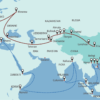
Investment Horizons: Türkiye And China’s Footprint in African Markets

Aktörler, Kurumlar ve Stratejiler Bağlamında Türk Ticari Diplomasi Faaliyetleri: Asya-Pasifik Bölgesi Örneği

Dünya Gümrük Örgütü’nün Cinsiyet Eşitliği Kurumsal Değerlendirme Aracı Üzerine Bir İnceleme

How Can Global Governance Foster Collaboration to Repair And Strengthen Supply Chains in the Post-COVID-19 Era?
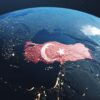
Küresel Sistemin By-Pass İhtiyacı

İşletmelerde Yeşil Yönetim

Gümrük Risk Yönetimi (CRMS) Çerçevesinde İthalat Kontrol Sistemi (ICS)

Son Düzenlemeler Işığında Kooperatifçilik Eğitimleri

Orta Koridor, Bağlantısallık, Dönüşen Küresel Konnektum ve Gümrük Birliği’nin Modernizasyonu
Ticaret Uzmanları Derneği (TİUD), Ticaret Uzmanları ile Uzman Yardımcılarının dayanışma ve birlikteliğini geliştirmeyi, ortak hak ve menfaatlerini korumayı, mesleki, sosyal ve kültürel gelişimlerine katkıda bulunmayı amaçlayan bir sivil toplum kuruluşudur.



